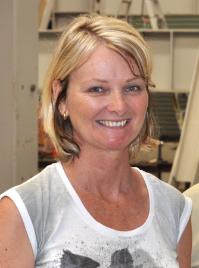Dealing with the threats of new technology
Published on 29 April, 2011
The Safety Institute of Australia has awarded CQUniversity researcher Elise Crawford as the winner of the three-minute thesis competition, in the student researcher category.
Grabbing the attention of judges was Elise's research focus on how human factors can influence the way safety-focused organisations cope with the adoption of new technology in control rooms.

Researcher Elise Crawford.The Research Masters in Health Science student said new technologies have the potential to offer many advantages to organisations; however they also introduce a certain element of risk.
"Given plenty of time, we can all adopt new technologies and learn how to use them. However safety critical organisations, such as the railways, air traffic control, power plants and distribution centres, cannot afford for their operators to be baffled by a new technology. They can't even tolerate a temporary lapse in control," explained Elise.
"The transition period during the adoption stage is a cognitive issue. Getting used to a new technology requires us to think, to learn, to solve problems, build new strategies, etc. The problem is that the workload for control room operators already involves significant levels of mental processing. Therefore, the introduction of new technologies in their environments can increase risk significantly."
The Australian Government initiative to alleviate congestion on our roads has placed greater demands on transport providers. Consequently, over the next 40 years, the Australian railway industry will experience a period of significant expansion to increase service capabilities. As a result, many new technologies will be introduced, some of which will affect the network controller and subsequent activity on the tracks.
In order to minimize these risks and optimise the network controllers' use of new technologies, Elise's research is looking for solutions to the system/operator interface problems which can cause operational incidents or accidents.
"I am looking for answers to the following questions: What is this problem between us humans and new technologies, and what slows down adoption? Some research has been conducted however no-one has addressed this topic in a holistic manner."
To fill this gap in knowledge, Elise is conducting interviews with end-users of technology, the control room operators from three industry groups - rail, air and power - to learn of the issues they face and how they cope in certain circumstances.
She is also surveying the opinions from new technology stakeholders to determine the different priorities of each group, to gain a better understanding of the pressures, commitments and goals that exist and how these affect decisions made concerning new technologies.
"Successful application of my research has the potential to improve the railway industry's success to take a greater role in transport provision. In this way, my research stands to affect us all. As I said in my ‘3 minute thesis' - so next time you're driving along and you feel the roads are less congested and road use is becoming more pleasurable, take a moment to think of our network controllers whose job has become a little more dependent on the technologies that assist them."
Since commencing her research Elise has had the opportunity to present her first paper entitled "Entering the Conceptual Age: Implications for Control Room Operators and Safety" at the International Control Room Conference in Paris.
This international conference was of particular importance as Europe leads the world in Human Factors research.
Following this, her second paper entitled "New Technology Adoption: Risky Business for the Railways" won the Human Factors & Ergonomics Society of Australia best paper award at their annual conference.

